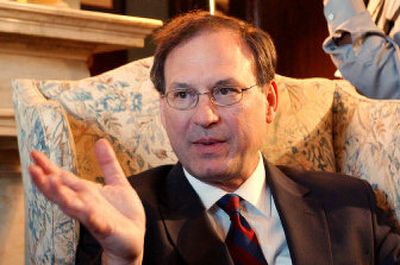Briefing book casts Alito as moderate

WASHINGTON – Supreme Court nominee Samuel Alito’s opinions on abortion, discrimination and other contentious issues are the work of a mainstream jurist, not the ideologue depicted by critics, the White House argues in a voluminous briefing book meant for Republican senators.
Alito’s dissent in a 1991 abortion ruling showed “concern for the safety of women,” the material says. By approving a requirement for spousal notification, he “reflected the position advanced by the Democratic governor of Pennsylvania.”
A 1996 dissent in a sex discrimination case in which Alito sided with the employer shows he “simply questioned the wisdom of a ‘blanket rule’ ” on dismissing such complaints before trial, in the White House view.
Bush nominated Alito, a judge on the 3rd U.S. Circuit Court of Appeals, to succeed retiring Justice Sandra Day O’Connor. Confirmation hearings before the Senate Judiciary Committee are scheduled to begin Jan. 9.
O’Connor often has cast the swing vote on 5-4 rulings on abortion and other issues, highlighting the importance of Alito’s nomination for conservative groups eager to usher in a new era at the court and for liberals who charge Alito would push it sharply to the right.
The White House compilation systematically lays out anticipated criticism of Alito on abortion, free speech, civil rights, religious liberties and other topics, then counters them in language that senators or other supporters might use in public. The bulk of the material is made up of legal citations.
Administration aides distributed their research to senior Republican aides on the Judiciary Committee in a White House meeting within hours of Alito’s appointment on Oct. 31.
Many of the same committee aides strongly opposed Harriet Miers’ nomination to the court, and the White House was forced to spend hours trying to prevent their views from coloring the impressions of GOP senators. Miers, the White House counsel, withdrew her nomination 10 days ago, leading to Alito’s nomination.
The Associated Press obtained a copy of the “Judge Samuel A. Alito Briefing Binder,” which runs roughly 600 pages.
In the case most frequently cited by critics who say he would roll back abortion rights, Alito is described as mindful of the trouble his view could cause women who seek abortions despite their husbands’ objections.
“The plight of any women, no matter how few, who may suffer physical abuse or other harm as a result of this provision is a matter of grave concern,” he wrote in his dissent.
Even so, he supported the requirement, arguing that whether the state legislature’s approach was sound policy “is not a question for us to decide.”
Alito’s position was rejected by colleagues on the 3rd Circuit as well as the Supreme Court.
The briefing book casts such opinions as a “restrained approach to judging and his adherence to the rule of law,” and says it showed Alito struggling conscientiously to apply precedent.
On workplace discrimination, the material says, “Judge Alito has rejected a one-size-fits-all approach.”
Apart from the case in which Alito sided with the company while the court ruled for the employee, the White House summarized five other cases in which he joined unanimous decisions favoring employees alleging workplace discrimination or harassment.
The White House also says that Alito has operated within Supreme Court precedents on states’ rights and congressional power.
On the issue of free speech, White House officials sought to rebut what they called the allegation that Alito “is an ideological conservative who would be too deferential to the government and do too little to protect the First Amendment right to free speech.”
Officials cited Alito’s opinion in the 2001 case of Saxe v. State College Area School District. In the unanimous ruling, the 3rd Circuit struck down a school’s anti-harassment policy, saying it was a violation of the free speech clause in the First Amendment.
A group of students who identified themselves as Christians had challenged the policy, saying their religion teaches them that homosexuality is a sin and they believe “they have a right to speak out about the sinful nature and harmful effects of homosexuality.”